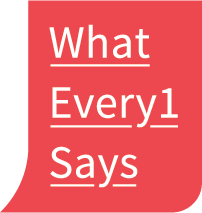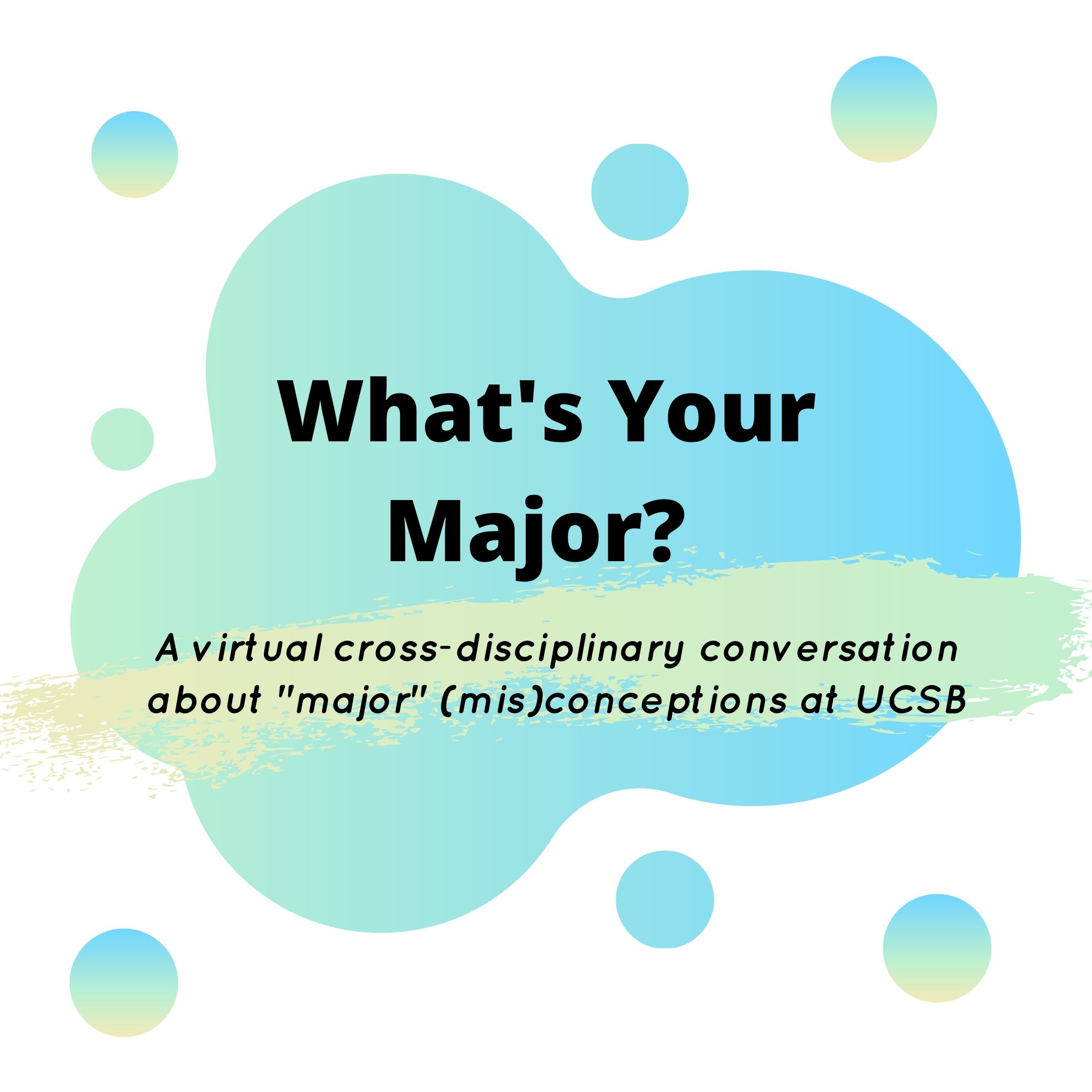Putting into practice the goal of turning research into action, the Human Subjects Team1 of the WhatEvery1Says Project (WE1S) at UC Santa Barbara recently hosted a panel event called “‘What’s Your Major?’: A Cross-Disciplinary Conversation about ‘Major’ (Mis)conceptions at UCSB”. The event was developed in response to early findings from the undergraduate survey our team conducted in Spring of 2019, which found that UCSB undergraduate students often feel stereotyped because of their major, but do not feel that they stereotype others. (See KF 8-2). The two primary goals of the panel were to increase peer-to-peer cross-disciplinary dialogue between different majors on campus, and to test out ways to involve our community in our research, while also improving our methods. Although initially planned as an in-person event, the panel was instead held over Zoom as a result of circumstances related to COVID-19.
“What’s Your Major?” took place on Tuesday, May 12, from 5:30-8pm PCT. Jessica Gang and Helen Foley, WE1S’s two undergraduate RAs, planned and moderated the event, which included inviting five fourth-year UCSB undergraduate panelists (two of whom were double-majors, and two of whom had minors) to speak from their experiences in various disciplines: Actuarial Science, Film & Media Studies, Communication, Mathematics, Physics, Political Science, French, and Professional Writing. The panel attracted undergraduates, faculty, and staff observers–in addition to the roundtable panelists and the Human Subjects Team–and the total attendance was 58 individuals.
We began the panel with a series of icebreakers in the form of anonymous Zoom polls. Of those who participated, when asked “What area of study do you identify with?,” 19 identified with Social Sciences, 11 identified with the Humanities, and 9 identified with STEM; we had a wonderfully diverse audience (see all poll results here)! In order to highlight our desire for humanities advocacy to bring different disciplines together, and not encourage divisiveness, we also emphasized to those present that the event was a dialogue, not a debate, and that all voices were welcome and encouraged.
The event began with an introductory presentation from Jessica and Helen about the WE1S project, as well as about the field of digital humanities as a whole. The audience was then asked to answer the same questions whose results were the inspiration for the panel: Do you think that others have/will have preconceived ideas about you based on your major?, and Do you define others based on their majors?. After the audience participants responded, they were presented with the original WE1S “key finding” (KF 8-2), where 100 undergraduate UCSB students had responded to the same question in Spring 2019. The results were fascinatingly similar (see visualization below2):

After we presented these results, we placed the audience members, panelists, and the Human Subjects team randomly into Zoom breakout rooms to discuss their impressions of the key finding, as well as share their thoughts about their majors in the process. After reconvening, we dove into the heart of the meeting, posing a series of questions (both those prepared in advance as well as questions from audience members written into the chat) to the panelists about their specific experiences within their majors. These included questions such as, Do you feel like you have been stereotyped or stereotyped someone else based off of your/their field(s) of study?, and Do you frequently have conversations about your major with people outside of your field?. After an hour and a half of productive dialogue, the panel was closed, and participants were once again placed in breakout rooms. There, they were able to address what had been brought up, as well as think of further questions. Once we brought the primary group back together, a more informal discussion carried on for another hour before the event ended. In the end, the event was a huge success!
One marker of this success was that audience members were quite eager to share their thoughts–so much so that we were unable to get through all of our prepared questions. One unexpected advantage to holding the event remotely, instead of in-person, was that the Zoom chat function served as a convenient “backchannel” for participation. Throughout the event, participants eager to engage in the conversation flooded it with comments and questions. The moderators and team members used the flourishing chat to guide the direction of the conversation through questions. Unprompted topics of conversation that arose, inciting high levels of engagement, were the educational value of extracurricular activities, personal struggles with the credit and class restrictions of the current major system, and the difficult experience of being a woman in STEM. Overall, “What’s Your Major?” not only allowed for the WE1S team to share our Human Subjects survey findings, but it also led to deeper discussion, more research questions, and audience members writing afterward to share that they were still thinking about topics that were addressed.
Above all, we were heartened by the appreciation that we saw for cross-disciplinary study and discussion. While our initial findings led us to believe that “major” stereotypes might contribute to sharp disciplinary divides amongst undergraduates, both the panelists and the audience members demonstrated tremendous enthusiasm for bridging any divides at the event. Their willingness to interact and engage with those in other majors proved that even if stereotypes do exist at the undergraduate level, students are still invested in pursuing opportunities to expand their knowledge beyond their academic major.
Interested in hosting your own event? Check out our Action Card 8-1 for ideas. And watch a full video of our event here!
Special thanks to Parry Dong, Natalie Bastawros, Christian Greer, Mika Pham, and Xander Apicella for being our panelists.
Helen Foley is a UCSB class of 2020 graduate, who earned her BA in Economics and English. She joined the WE1S UCSB Human Subjects Research Team in January of 2020, and now hopes to continue her academic pursuits in graduate school!
1. “Human subjects research” refers to research conducted with living people. (See the WE1S methods card M-6 on the role of human subjects research in the overall WE1S project.) Our study consisted of a survey of the UCSB community as well as three focus groups. For more information about our research, see the Human Subjects Page of the WE1S website, along with this introductory blog post. ↵
2. The percentages displayed in these charts do not directly match the charts on KF 8-2, because we chose here to make a comparison using only the numbers of participants who responded. It is important to note that, in the surveys, “When asked “Do you think that others have/will have preconceived ideas about you based on your major?”, 89% of respondents (88 of 99 participants) replied “yes” and 11% (11 participants) replied “no.” However, when asked “Do you define others based on their majors?”, only 44% (44 of 100 participants) said “yes” and 56% (56 participants) said “no.”? ↵



